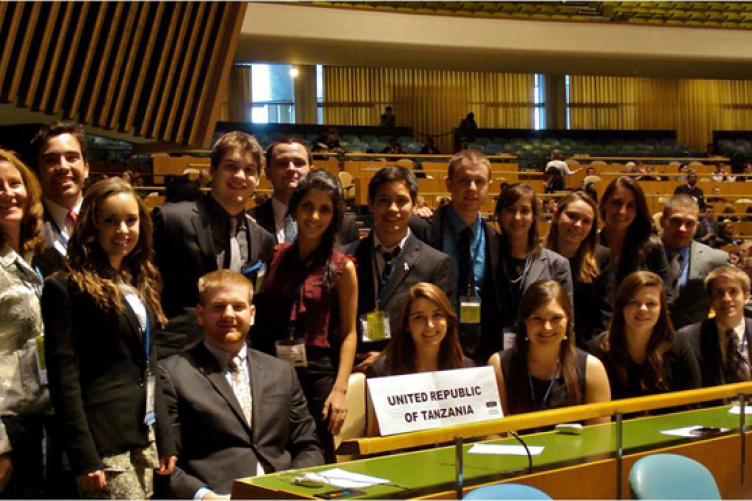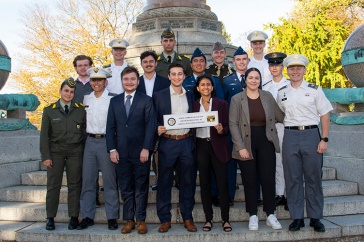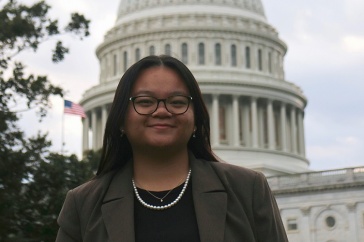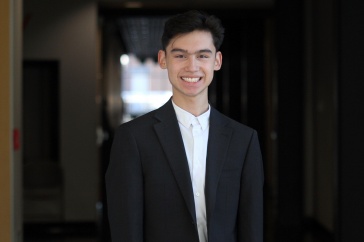
UNH 2012 Model UN Team. From left to right, front row: Danielle Duchesne, Andy Schafer, Anu Rayamajhi, Camilla Cooper, Hannah Waller, Christine Turner, and Kevin McAleese. Back row: Prof. Alynna Lyon, Pat McManus, Dave Carrigan, Mike Dobrinksi, Leo Ocampo, Luke Hansford, Amanda Condon, Kayleigh Mitchell, Kellie Shea, and Brooks Payette.
|
|
The University's Model United Nations team has been recognized as a distinguished delegation for its representation of the African country of Tanzania. The students attended Model UN earlier this month in New York City where they received the honor, which only 10 percent of the teams earn, and also took home the award for best paper.
“When our name was finally called, it was such a proud, exciting, and relieving feeling. We knew we had done really well at the conference and were excited about the work we had done, and to be recognized for our dedication and level of involvement at the end of the year is incredible and rewarding,” said junior Danielle Duchesne, president of UNH’s Model UN team.
According to Alynna Lyon, associate professor of political science and the faculty coordinator for the UNH Model UN program, for the first time UNH students took home the awards for “Distinguished Delegation” and “Best Paper.” The award-winning paper was written by Kayleigh Mitchell, a senior from Merrimack, N.H.
“This particular group demonstrated extraordinary commitment both in preparation and at the conference itself. Many students began working on their papers months prior to the simulation, and the selection of students to attend New York was competitive,” Lyon said.
More than 5,000 delegates, half from outside the United States, come to New York City each spring to discuss current global issues on 20 selected committees. Outside conference sessions, delegations enjoy the proximity to Permanent Missions of other countries to the United Nations and to the United Nations itself.
To compete at Model UN, the team developed a profile of Tanzania that included information on the country’s demographics, history, and government. Each team member was responsible for research relevant to their particular UN committee and the topics to be covered at the conference as they related to Tanzania. Students also prepared for the resolution paper process, giving speeches in committee, and the flow of debate and parliamentary procedure.
“The goals of the group going into the week were to participate in the conference as much as possible, to lead collaborative initiatives to best represent Tanzania's role as an exceptional state in Africa, and to make sure to embody the spirit of the UN with compromise, collaboration, and developing solutions that could be accepted by consensus,” Duchesne said.
“Tanzania has no strong opinions against any country, so it was great to be able to work with so many countries from all different areas of the world. However, it would often be difficult to work with countries within the African Union because Tanzania is an exception to much of Africa. Africa includes 53 independent member-states to the UN, and they are typically clumped all together as having all of the same problems, same people, and same development rates under ‘Africa.’ However, Tanzania has managed to escape many of the problems that have plagued many other states because of its stronger, stable government,” she said.
While in New York City, the UNH students met with officials with the Tanzania Permanent Mission to the UN, including Justin Seruhere, minister plenipotentiary on disarmament and international security, and Modest Mero, minister plenipotentiary on economic and financial matters. After speaking with the officials, the students proposed a number of legislative initiatives at Model UN, including controlling small weapons use and illicit trade in areas of conflict and refugee populations, and asking more developed countries to support lesser developed countries in implementing strategies and plans for sustainable and green development.
“We are all very proud of the solutions we created because they are all in character with Tanzania's aspirations, and real-world situations and capacities,” Duchesne said.
-
Written By:
Lori Tyler Gula, PhD | NH Agricultural Experiment Station | lori.gula@unh.edu | 603-862-1452

















































